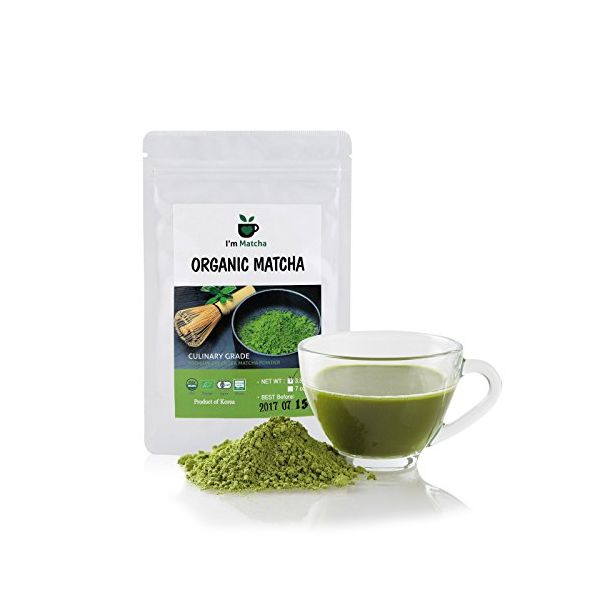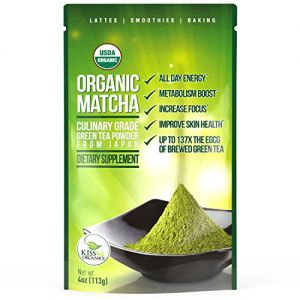I'm Matcha Organic Matcha -Green Tea Powder
3.5 oz (100 g) or 7 oz (200 g)
USDA-certified Organic Matcha green tea powder for enhanced metabolism, improved weight control, stronger immunity, and heightened cognitive function. Matcha green tea is well-known for its powerful, health-boosting components such as antioxidants, caffeine, and the amino acid L-Theanine.
Best For
Enhanced energy, metabolism, cognitive function [1, 2]; Overall health [1-6]
Results
5/5
- Pros:
- USDA-certified Organic Matcha green tea powder for enhanced metabolism, improved weight control, stronger immunity, and heightened cognitive function
- Well-known for its powerful, health-boosting components such as antioxidants, caffeine, and the amino acid L-Theanine
- Increases memory and concentration
- Benefits can last up to 6 hours due to L-Theanine
- Enhances mood
- Relaxes the mind
- Caffeine in Matcha is released into the bloodstream slowly
- Matcha's caffeine has an alkalizing effect that has a much gentler influence on the stomach
- Gradually aids digestion and cleansing
- No negative side-effects such as hot flashes, increased heart rate, or high blood pressure
- Excellent coffee substitute
- Metabolism booster
- Weight management supplement
- Can be added to a variety of recipes for Lattes, Smoothies, and Shakes
- Comes in an easy to use zip lock package that allows the Matcha Green Tea Powder to stay fresh for long periods of time
Ingredients Concern: None discovered
Cons: Consuming large amounts of Matcha may lead to an upset stomach, Avoid exposure to high temperature, direct sunlight and keep in cool, dry place
Matcha green tea powder has been shown to improve energy levels and overall health by boosting blood flow, immune system and hormonal activity, and cellular health [1-4]. It also enhances metabolism, which promotes stamina as well as improved weight control [1, 2]. Furthermore, matcha contains L-Theanine, which promotes relaxation while increasing concentration [4-6].
Enhanced energy, metabolism, cognitive function [1, 2]; Overall health [1-6]
Green tea contains caffeine, which is well known for boosting energy, but it also contains active substances called polyphenols (antioxidants), which stimulate the growth of mitochondria (energy-producing cells) and protect cells throughout the body from free radical as well as toxin-induced damaged [1, 2]. The stimulation of mitochondria heightens blood circulation, enhances immune activity, and improves cell activity, all of which boost energy levels.
Green tea also contains epigallocatechin gallate (EGCG), which is a nutrient that regulates energy balance, hormonal activity, and metabolism [1-4]. In particular, about 250-300 mg of EGCG heightens metabolism while at rest and during exercise, and this helps maintain an optimal energy balance when individuals are inactive or engaging in physical activity, but it also improves helps weight control [1].
Matcha also contains L-Theanine, which is an amino acid that targets anxiety, induces relaxation, and enhances concentration [4-9]. In particular, L-Theanine stimulates the activity of neurotransmitters that help regulate focus and attention [5-9].
Key Ingredients: Organic Matcha 100%
All Ingredients: Organic Match 100%
Matcha green tea powder can be blended with water, milk, and almond milk for recipes such as lattes, smoothies, and shakes.
These statements have not been evaluated by the FDA. These products are not intended to diagnose, treat, cure or prevent any disease.
1. Hodgson AB, Randell RK, Jeukendrup AE. The effect of green tea extract on fat oxidation at rest and during exercise: evidence of efficacy and proposed mechanisms. Adv Nutr. 2013;4(2):129-140.
2. Boschmann M, Thielecke F. The effects of epigallocatechin-3-gallate on thermogenesis and fat oxidation in obese men: a pilot study. J Am Coll Nutr. 2007;26(4):389S-395S.
3. Thielecke F, Rahn G, Böhnke J, et al. Epigallocatechin-3-gallate and postprandial fat oxidation in overweight/obese male volunteers: a pilot study. Eur J Clin Nutr. 2010; 64(7):704-713.
4. Cartwright, RA, Roberts EAH, Wood DJ. Theanine an amino acid of N-ethyl amide present in tea. J Sci Food Agric. 1954;5:597-599.
5. Einöther SJ, Martens VE. Acute effects of tea consumption on attention and mood. Am J Clin Nutr. 2013;98(6 Suppl):1700S-1708S.
6. Nobre AC, Rao A, Owen GN. L-theanine, a natural constituent in tea, and its effect on mental state. Asia Pac J Clin Nutr. 2008;17 Suppl 1:167-8.
7. Song CH, Jung JH, Oh JS, Kim KS. Effects of thianine on the release of brain alpha waves in adult males. Korean J Nutrition. 2003;36:918-923.
8. Türközü D, Şanlier N. L-theanine, unique amino acid of tea, and its metabolism, health effects, and safety. Crit Rev Food Sci Nutr. 2017;57(8):1681-1687.
9. Camfield DA, Stough C, Farrimond J, Scholey AB. Acute effects of tea constituents L-theanine, caffeine, and epigallocatechin gallate on cognitive function and mood: a systematic review and meta-analysis. Nutr Rev. 2014;72(8):507-22.
Write Your Own Review



